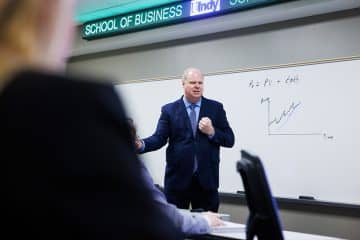What is a Non-Traditional Student?
The term non-traditional student, or adult learner, is tossed around a great deal in the modern college vernacular. It’s all over marketing, newspaper articles, and more, but it’s rarely explained in detail.
Let’s first start with the definition of a traditional student. When you hear the words “college student,” you probably picture someone aged 18-24 who went straight from high school to college to take classes full time. They haven’t yet started their careers and, if they do have a job, they likely do part-time work to help pay their bills. Primarily, however, they devote most of their time to classes and other activities on campus. This popular notion of a college student is exactly why they are considered traditional.
A non-traditional student, therefore, is anyone who attends college in a format or time frame that differs from that typical route. A number of things can set the non-traditional student apart, but they are usually over 24 and have had multiple years of work experience (including stay-at-home parenting) between high school and college. They likely have more responsibilities and established work, family, and other life commitments.
Why Do Non-Traditional Students Return to School?
There are countless and valid reason why a student may not transition straight from high school to college. Likewise, there are many reasons why an adult may decide to return to school after they pass the traditional age. Here are just a few common themes that influence this decision:
- Career changes – Most non-traditional students are going through a career change, whether that be by choice and a change of interest or by force from changes in the economy and job market. A higher degree and further education can be just the thing to prepare them for a brand-new field.
- Goals for promotion – Many adults find that a stronger educational background can help them advance even further in their careers. The extra credentials and training give them a notable advantage, even after years of work in their industry.
- Retirement – After they retire, plenty of adults seek out new things to learn through college courses.
- Personal growth – Not all college students are merely seeking to improve their career prospects. Even before retirement, many adults are attending school simply to learn things they’ve always wanted to know.
The Needs of an Adult Learner
Because non-traditional students have more life experience, they usually have different obligations and needs than their younger traditional counterparts. It’s because of this that they are sure to benefit from flexible class schedules and other forms of support that allow them to enroll in school without putting everything else on hold. Here are some ways that schools can help non-traditional students balance college with their other commitments:
- Online classes – Online classes can be extraordinarily helpful for non-traditional students. Many of them are self-paced, allowing students to learn and submit homework at any hour of the day. There are also synchronous courses, or courses that require students to log in at a certain time for live discussion and lectures, but the online format nevertheless makes it easy to go to class without a commute.
- Prior learning credit – Many adult learners return to school to complete degrees that they had already started but never finished, whether that be due to family, financial, or other constraints. Depending on the school, degree-completion programs may accept credit from previous education, allowing students to save money and fulfill their requirements more quickly.
- Placement testing – Years of life experience often give returning students skills that younger traditional students have yet to obtain. Through placement testing, colleges can often give credit for various life experiences as a way of fulfilling their degree requirements.
- Financial aid – Especially for students with families and independent bills and responsibilities, paying for a college education is not easy. Thankfully, financial aid is becoming increasingly available to adult students. No longer restricted to the traditional population, financial aid and scholarships help relieve that extra burden.
The Non-Traditional Experience
As more and more institutions develop their programming for non-traditional education, adult learners are finding extraordinary value in their decision to go back to school.
Among many great schools, like those featured throughout Abound, students are finding tremendous benefits through the programs that are conscientious of their life commitments and experiences. Those who find the right fit for their needs enjoy:
- Easy class scheduling and registration
- Great value for their tuition costs
- Structured and comprehensive instruction
- Direct feedback and communication from their professors
- More personalized attention than they would receive at a large university
Non-Traditional, but Not Uncommon
Though adult learners are referred to as non-traditional, that doesn’t mean they are rare. In fact students are rapidly becoming the norm in higher education. As more and more people seek degrees later in life, they need to look for schools that cater to their unique life commitments and goals. The non-traditional experience is different for every student, and non-traditional programs and offerings vary at every school. Abound: MBA recognizes that there are many options for each individual experience and helps narrow down the options to schools that are Accessible, Affordable, Accelerated, and Advanced. Take a look at the schools we trust and find the program that works for you.




